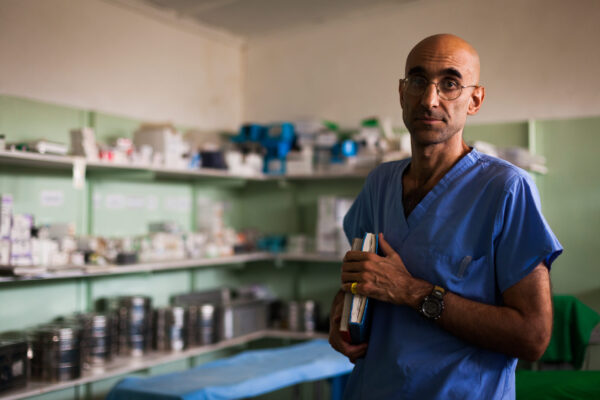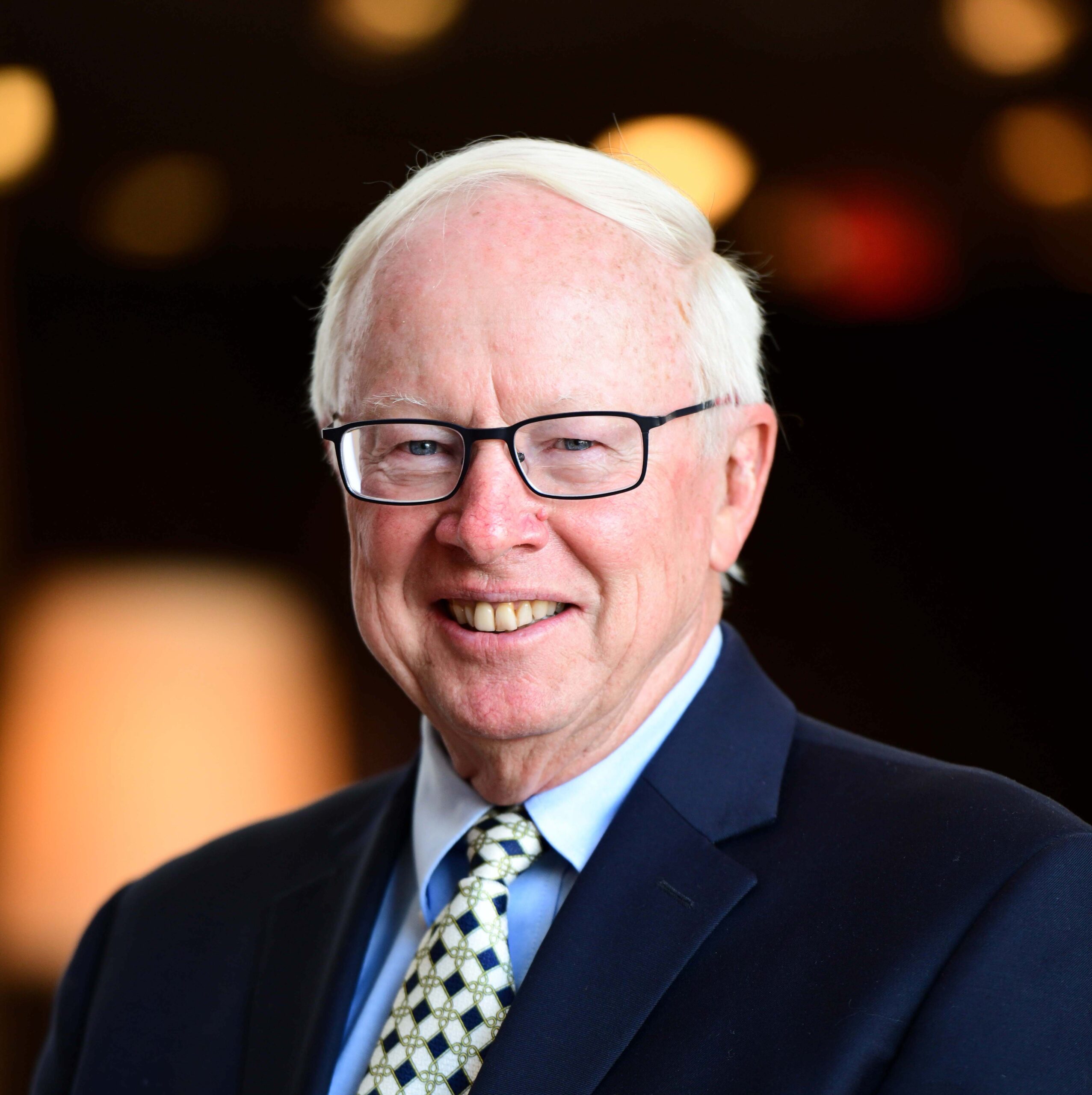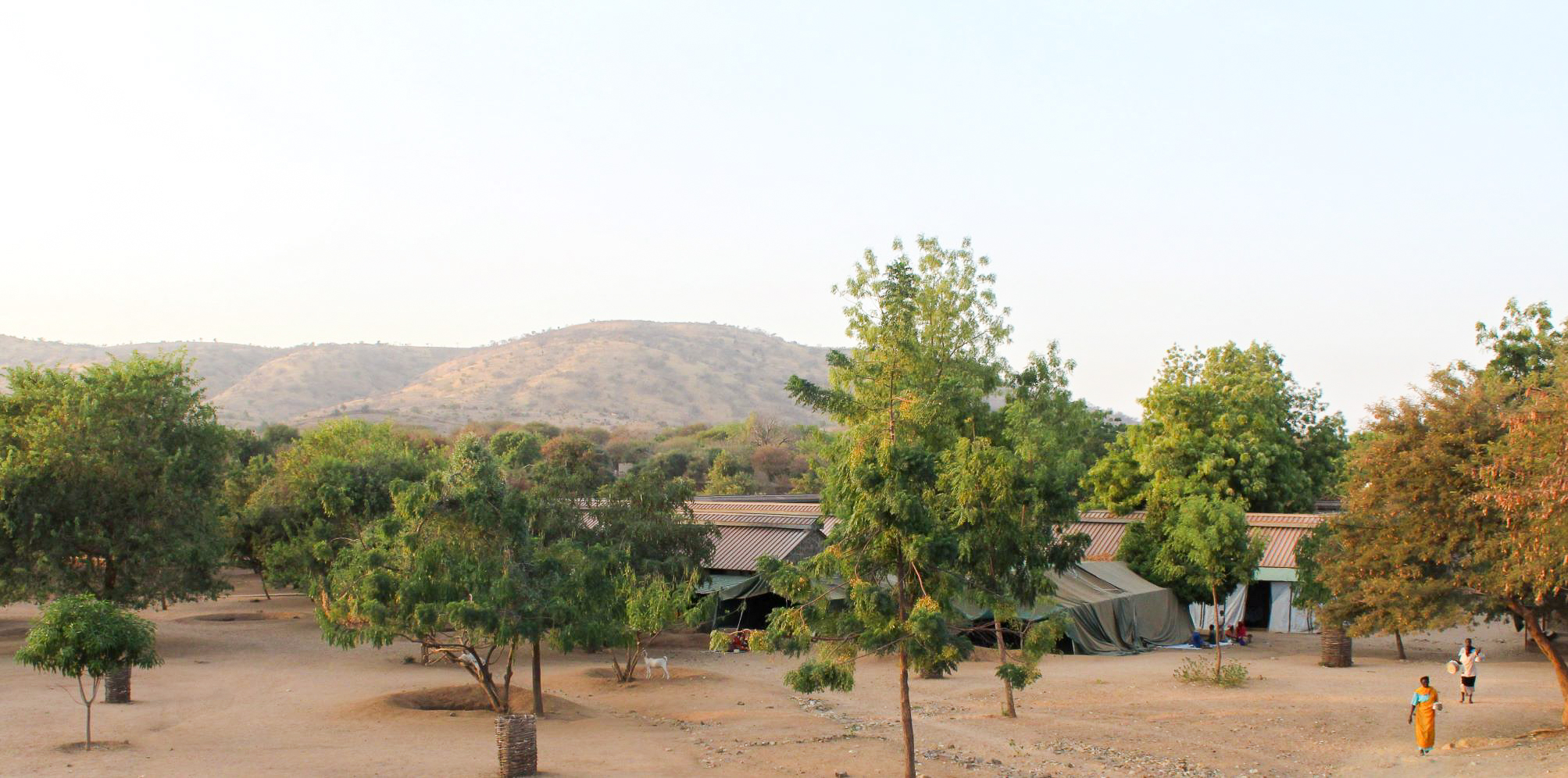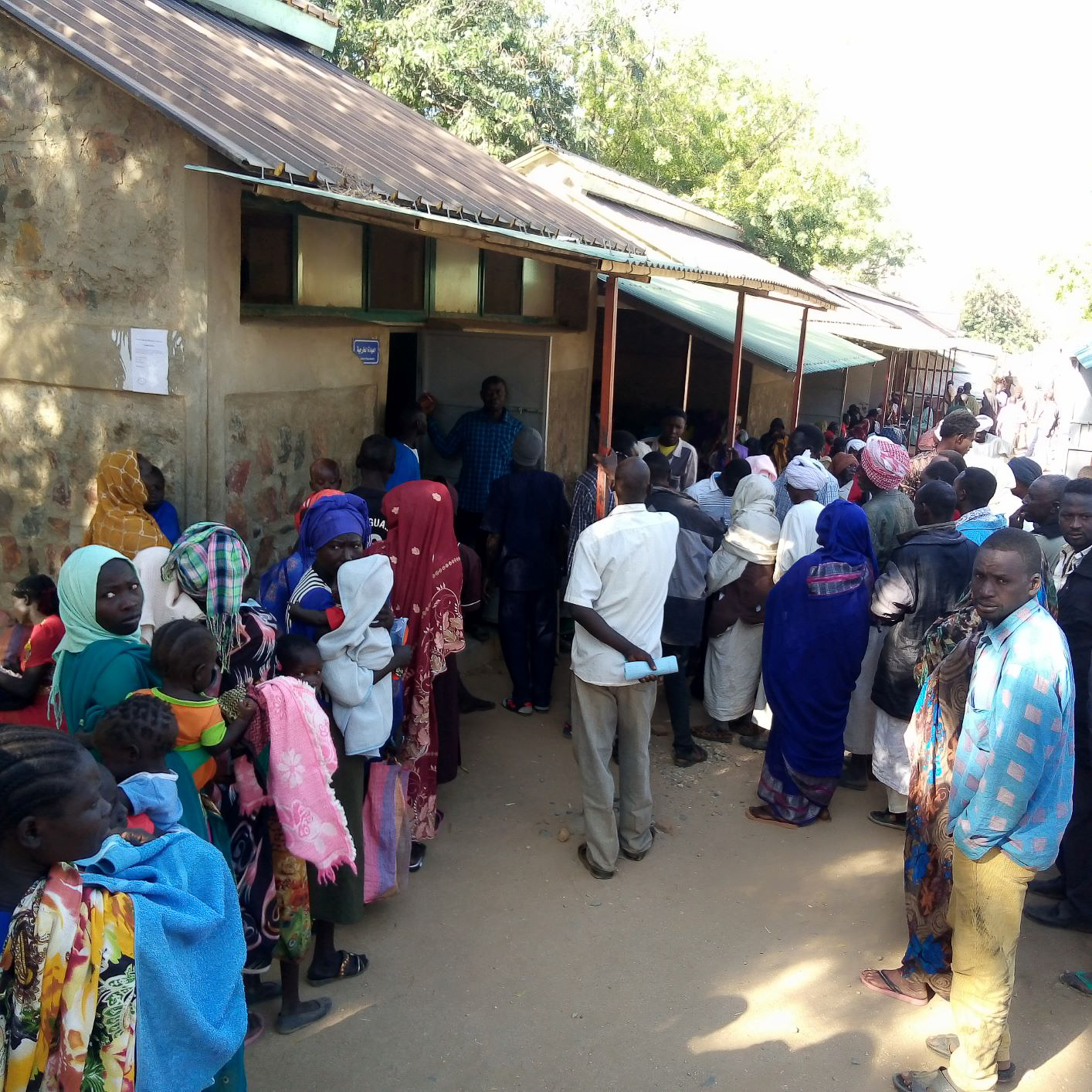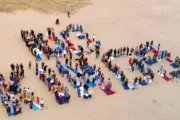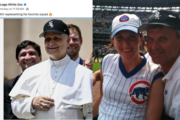This article was originally published by Religion Unplugged, with the support of CRCC’s global project on engaged spirituality.
GIDEL, Sudan — The media is filled with articles on how to achieve happiness, including in serious magazines such as The Atlantic. But should happiness be the focus of one’s life, or something deeper?
Several years ago, I met Tom Catena, a doctor for 14 years in the the Nuba Mountains in Sudan — a desolate, rebel-held area that was bombed repeatedly from 2011 until 2018 by the Khartoum government when Omar al-Bashir was president. Tom has been the subject of a documentary film, a winner of the Aurora Prize, and profiled by Nicholas Kristof in the New York Times.
In a recent WhatsApp call with me, Tom made an important distinction between happiness and joy: Happiness is an emotion that changes from hour to hour and day to day. Joy is more deeply rooted. It comes from living a purposeful life — in his case, following a religious calling. He said some days he is ecstatic. But most weeks he is working 24/7, confronting challenge after challenge, performing 2,000 surgeries a year and dealing with 130,000 patients, since his hospital serves a catchment area of over 750,000 people.
If being happy were his motivation, Tom’s often grueling life would not be fulfilling. But the joy he derives from doing hard, meaningful work as an expression of his faith fulfills him and touches the lives of those around him.
The hospital compound in Nuba
In 2008, after working as a doctor for seven years in Kenya, Tom headed to Gidel in the Nuba Mountains, where he assumed leadership of a newly constructed 435-bed hospital. The journey to the hospital is a multiple day affair by four-wheel drive vehicle on a road that is nearly impassable in the rainy season.
The Mother of Mercy Hospital operates on solar power with a backup generator. Diagnosis is done the old-fashioned way, by poking, prodding, observing and talking to patients. There is a very simple lab where staff can do basic blood and urine tests. There is no MRI machine, only a portable X-ray and several ultrasound devices for identifying tumors and examining pregnant mothers.
The hospital is almost always at capacity. In a typical day, Tom will see 350 or more patients on rounds in the children’s, women’s and men’s wards. On a hill above the hospital, there is a residential facility for people with tuberculosis or leprosy, as well as a school for the children of these patients. In clinic, Tom may see another 50 to 60 patients. There is a staff of 20 or so nurses and several physician’s assistants who do pre-rounds before Tom arrives at a patient’s bed. Two days a week, Tom does surgery. During the most intense period of the civil war, Tom was sometimes confronted with an additional hundred or more patients as trucks brought in people who had been wounded by bomb blasts.
Tom has performed hundreds of amputations — from the bombing as well as leprosy. During the war, the hospital functioned like a MASH unit. Tom remembered amputating the arms of a boy who was hugging a tree when shells exploded nearby and shredded his hands. The villagers dug 30 to 40 fox holes that hospital staff and others would dive into when they heard the planes approaching. Miraculously, the hospital never experienced a direct hit. But people would come for treatment from all over the surrounding area.
When I talked with Tom earlier this year, he had returned recently from the U.S., where he was treated for a herniated disc that was affecting his walking. While transiting back to Nuba, he stopped in Nairobi, Kenya, and told some local missionary doctors that he was experiencing severe headaches. They immediately did a lumbar puncture and determined that he had TB meningitis. In another week, he might have lapsed into a coma. On an almost routine basis, Tom comes down with malaria, and once he was briefly in a coma while he fought through the high fevers associated with the infection.
Prior to getting married in his early 50s, Tom was making $350 a month as a medical missionary. Since marrying Nasima, a local woman from Nuba in 2016, and adopting their child, Francis, he now takes off from work Saturday afternoon and evening and most of Sunday, but he is still on 24-hour call if there is an emergency. He said getting married has made him more human, and he looks forward to time with his wife and son, even though he seldom is home before early evening and begins his rounds at the hospital at 7:30 a.m.
The journey to Africa
Tom grew up in a close-knit Italian family in upstate New York, surrounded by six siblings. His father was a judge. His great uncle was a physician and immigrant from Italy. Tom joined a fraternity at Brown University, a highly selective school, and was an all-star football player at 230 pounds as a defensive nose guard. When I first met him in Yerevan, Armenia, where he received the Aurora Humanitarian Prize, I doubt if he weighed 150 pounds. He was wearing the suit coat in which he graduated, which hung limply on his broad shoulders and skeletal frame. As we sat outside his hotel in the patio sipping coffee, I asked him about his journey to the Nuba Mountains.
Tom said that he majored in mechanical engineering and upon graduation was offered a job by GE in its nuclear division. This would have been a natural progression: fraternity boy, athlete, good job and a house with a picket fence in the suburbs. His girlfriend was disappointed and dumped him when he told her that he had decided to go to medical school and be a missionary in Africa.
Tom had grown up as a cradle Catholic, going to Mass every Sunday with his family. While at Brown, however, he joined an ecumenical Protestant group and formed a strong bond with the advisor, who mentored him. In this evangelical setting, he started to realize that Christianity was not simply about ritual behavior, although he said he still loves the awe-inspiring quality of Catholic liturgy, with its incense and stained-glass windows. Upon graduating, he got another perspective on religion when his parents joined a Catholic charismatic prayer group that opened his eyes to the deep connection between mind, body and spirit. Today, Tom considers himself a hybrid evangelical-Catholic, but someone who has elected to stay within the structure of the Catholic Church.
Shortly after graduating from college, Tom decided to decline the job offer at GE and become a missionary doctor — not because of some mystical voice from the sky but rather because he felt that he could serve God and people in a more full-hearted way as a doctor than as an engineer. This required him to take some additional premed courses and study for the MCAT entrance exam to medical school. During this transition year, he traveled to Japan and taught English. He also needed to figure out a way to pay for medical school and so applied to the U.S. Navy for a scholarship, which then required him to serve for four years as a flight surgeon after finishing medical school at Duke University. He said that mostly meant treating pilots for colds, although it also allowed him to travel around the world. After medical school, he did a one-year internship in the Navy and a two-and-a-half year family medicine residency in Terre Haute, Indiana. He was also able to slot in two one-month medical mission trips — to Guyana in 1997 and Honduras in 1998. Tom was now ready to start his career as a missionary doctor in his mid 30s and decided to go to Africa for one year.
When he arrived in Kenya, Sister Bridget, his mission contact, said, “Oh, great. You’ve come for two years.” So, Tom decided he better settle in for longer than he thought and headed to Our Lady of Lourdes Mutomo Hospital in rural Kenya. After two years, he went to Nairobi, where he was a consultant at St. Mary’s Mission Hospital and spent five years learning surgery under the direction of a very skilled African American doctor. It was in Nairobi that he heard about the hospital that was being completed in the Nuba Mountains, and what attracted him to a posting there was the challenge.
When I hosted Tom on a visit to Los Angeles in 2019, he spoke to medical students at the University of Southern California and UCLA. They peppered him with questions, clearly intrigued that he would give up a potentially lucrative career in the U.S. to be a medical missionary in Africa. In an undergraduate class at USC, he was again asked why he chose to go to the Nuba Mountains. He responded by quoting the notorious bank robber Willie Sutton, who, when asked, “Why do you always rob banks?” replied matter-of-factly, “Because that’s where the money is.” By analogy, Tom said he was asking himself, “Where is the greatest human need?” And when the possibility arose of going to the Nuba Mountains, he was all in. In this region of Sudan, the size of Austria or the U.S. state of Georgia, there were no hospitals and almost no clinics.
When Tom arrived in Nuba under the sponsorship of the Catholic Medical Mission Board in 2008, the staff was very poorly trained, and few of the nurses had more than a primary school education. Now, almost fifteen years later, there are 27 trained nurses and midwives. There are four qualified medical officers — the equivalent of a physician’s assistant in the U.S. — and several medical doctors in training in nearby countries, plus one recent graduate who has done a residency in Tanzania in eye surgery and is now performing multiple cataract surgeries every week. This staff has taken considerable pressure off Tom, although he still performs 15-20 major and minor surgeries every Wednesday and Friday — plus making rounds to the wards on Monday, Tuesday and Thursday.
Avoiding burnout
When asked how he keeps up this pace, Tom said that he had read about burnout being a problem in the U.S., where a typical doctor sees a fraction of the patients Tom interacts with daily. He said part of the reason for burnout is that these doctors are dealing with the same issues repeatedly, whereas there is enormous variety and challenge every day in his practice, where he sees everything from cancer to appendicitis. Plus, he is managing personnel issues, equipment breaks downs and medication shortages. Meanwhile, there are no insurance papers to fill out.
One thing that continually buoys Tom’s spirits is the resiliency of the people he serves. Some have walked for days to get to the hospital. When he feels discouraged and frustrated, or when a child dies, he reminds himself why he is there: “I’m a Catholic missionary, so for us the role is fairly simple and straightforward. Christ said, ‘Go and take care of the least of my brothers and sisters,’ and that’s what I see myself doing. I can’t find a more frustrating job, but at the same time, I can’t find something which would give me more satisfaction.”
During the civil war, when the Khartoum government was bombing Nuba day after day, all the nongovernmental organizations left because of the danger to their personnel. Tom was also ordered to leave, but he told the mission board, “I’m a volunteer. You can’t fire me.” And so, he stayed. Tom said that he could not leave Nuba because he would be placing greater importance on his own life than the people there. This decision earned Tom considerable credibility with the local people and led one Muslim imam to say, “He is Jesus Christ, because he is healing the sick, helping the lame walk and making the blind see.” Reflecting on his decision, Tom said, “You are not much of an example to the people of the love of Christ if you take off when things get tough.”
While one could call Tom a masochist, he has a different perspective, which is rooted in gratitude for the things that were given to him — including a wonderful family, great parents, great siblings and the best education in the world. “For me, it’s kind of not fair. Why was I given all these benefits in life and 99% of the world were not?”
In a short film that was produced by the Aurora Prize staff during the midst of the civil war, Tom says, “When those things happen (people dying, children being hit with shrapnel, etc.), you say, ‘Let me do any other job in the world. Let me be an accountant, because books don’t bleed, people don’t die — you just do the numbers.’” But then, he said, something brings you back — a child survives, someone gets well. You say to yourself, “Keep strong for the next person who might need you.”
The religious framework
Every morning Tom arises at 5:30, whether he feels like or not. He makes his way to the local Catholic church, saying the rosary on his way. He arrives at 6 a.m. and has a half hour of quiet prayer. Mass is celebrated from 6:30 to 7 and includes readings, prayers, a short homily from the priest and Communion. Tom’s attitude while in church is, “God, I’m here to do your work; help me out.” He then returns home for a cup of coffee and some bread. Rounds at the hospital begin at 7:30 a.m.
Tom says that he needs the discipline of going to Mass every morning. This experience frames the rest of his day. It reminds him why he has made this commitment to the people of Nuba. When a child dies or an operation does not go as planned, he acknowledges, “I am not the author of life and death. All I can do is my best and leave the rest to God.”
His job, said Tom, is to be faithful to his calling. “I think if I didn’t see it as a calling, a direct response to Christ’s plea to take care of our brothers and sisters, I don’t think I could continue,” he said. “Let me do something else. This is too hard. I can’t imagine doing it without faith.”
For Tom, the model for his life is Christ — the way of the cross. He said, “The cross is very symbolic. You’ve got to pick up your cross and follow me. The cross is heavy. It’s difficult. I don’t think Christ means this in a figurative sense but also in a very literal, face-in-the-dirt kind of sense.” In Tom’s view, life is not easy. In fact, he said that it is “fricking” hard.
True religion, for Tom, is counter-cultural. It runs against the grain of superficiality that is married to consumerism. Tom said, “If you look at the great spiritual leaders, they were not guys that went along with the flow. If you are too comfortable with the culture, there is something wrong.” He rejects the marriage of evangelical culture with a right-wing political agenda. True religion should be independent of political ideology, in his view. Jesus ended up on a cross, not as a head of state.
Tom Catena with his family.
In a discussion with USC students, Tom said that he had been invited to a Super Bowl party in a lavish home where there were flat screen TVs and food in every room. He was taken on a tour of the owner’s collection of antique cars. Tom said that any one of them could have funded his hospital for a year. His advice to students was, “Divest yourself. Get rid of your crap. Unburden yourself.” He made specific reference to cellphones, which he noted had proliferated since he had been in the U.S. three years previously. Continuing, he said, “The good life is not having a car collection; the good life is living a life of service. By doing that, you’ll have such incredible meaning that everything else will pale by comparison.”
But he said that he was not against people making money. The question is what you do with your money. In fact, he said that programs like his hospital need money to operate — to buy medications, pay staff and build and maintain buildings. The key is to find your purpose and be in the center of God’s will. The opposite of purpose is despair, he said. That is the great enemy, and it is compounded when you focus only on yourself and your needs. He said the challenge is to help someone else rather than ask, “What’s in it for me?”
Tom has sympathy for students who are questing after a purposeful life. Drawing on his own experience when he graduated from college and decided to give up engineering as a career, Tom said the late teens and early 20s can be a very confusing period. His recommendation to students was to find a holy person and seek their counsel. Pray deeply, he said, and ask God what God’s will is for your life. In his view, “Everybody’s path is going to be different.” He admires wealthy people who use their money for human flourishing and specifically cited the founders of the Aurora Prize as an example.
Some knotty problems
In one of my first conversations with Tom, I asked him about the problem of theodicy — namely, how can a good and all-powerful God allow for all the suffering in this world? He gave a classic answer, which is that God gave humans free will. “God in his goodness doesn’t want to control us,” he said. God did not create evil; humans choose to do bad things. If we did not have free will, he said, our love of God or others would be meaningless; we would be mere robots.
It was a concise answer, filtered through his experience of being bombed by someone with evil intentions — the war criminal Omar al-Bashir, the former president of Sudan. We did not get into the stickier issue of why some children are born with defects or why God doesn’t control natural disasters, such as earthquakes, floods and tornadoes. But we did get to the subject of why he believes in God, and he gave an answer that is a classic theological argument — the argument from design.
As a physician, he said the body and all its systems are so complex, this could not have happened by chance. Likewise, he said he marvels at the cosmos and said there may have been a Big Bang at some point, but there also seems to be order in the universe — as in the human body. But underneath these rational arguments, the bottom line seems to be that religion works for him. It both consoles and inspires. It gives his life meaning and purpose. It allows him to do the work that he does.
I also asked him about the corruption in the church, both Catholic and Protestant. He did not duck the question. He said religious institutions are filled with corruption, but that is not his focus. He is surrounded by people in the medical mission field who are inspired by their faith. These are people who do not want an easy life; they are focused on living a purposeful life of service to others. Tom said that 99% of the time, he sees the opposite of corruption, and he pointed to the Catholic sisters from Mexico and Uganda who work with him. “I see the force that religion has, that drives people to do works of great compassion and mercy.”
The way forward
Tom said that he is not a guru. In fact, he seems a little baffled by the attention he has received — although he welcomes the prize money to help fund his hospital, which is supported entirely by donations. The last time I asked Tom, he said the annual budget is about $800,000. Tom realizes that he needs to create a succession plan, and he is actively working on it by sending local people out for training as well as drawing on resources from nearby Uganda. Since 2018, there has been a ceasefire in the rebel-held territory of Nuba, but new challenges are emerging, including cases of HIV and COVID-19, although the latter has fortunately been rare.
In my various conversations, Tom often referred to the 13th century figure St. Francis of Assisi, who is reported to have said, “Preach always, and sometimes use words.” Tom’s goal is to preach using the medical skills that he acquired at Duke and in his various residencies. In his view, one shows the love of Christ through one’s actions. Tom said that he admires St. Francis because “he was somebody who was rich, who made himself poor to serve God and to serve people.” He views St. Francis as being counter-cultural in his time, but he was not a revolutionary who abandoned the church; instead, he sought to reform it from within — and that is also Tom’s commitment, to be an example of service as a Catholic lay missionary.
In the first interview I did with Tom in Armenia, he mentioned Pope Francis’ book “The Joy of the Gospel.” As a missionary, Tom resonates with the theme of this book, which is that evangelization is to be outwardly focused — leading a life of service as an expression of Christ’s love. Tom is not uncritical of the Catholic Church and recognizes that it is a human institution; but he also embraces the mission of the church, which is to evangelize through actions as much as words.
Given the challenges of his life in Nuba as a medical doctor, Tom’s focus is not on happiness but a deep-seated joy. He said about life in Nuba, “The frustrations are not going to go away. We never reach the point where things are smooth. It’s always going to be difficult here.” And perhaps that is true of life in general — there will always be challenges. The key for Tom is to be in the center of God’s will for his life. Therein is joy. And if the religious language of Tom’s faith is difficult to swallow, then one might substitute the language of deep-seated purpose that aligns with the spirit of love and justice, more universally understood.
Read the story on Religion Unplugged
Photos courtesy of Tom Catena or the Aurora Prize.
Donald E. Miller is the co-founder of the USC Center for Religion and Civic Culture.
